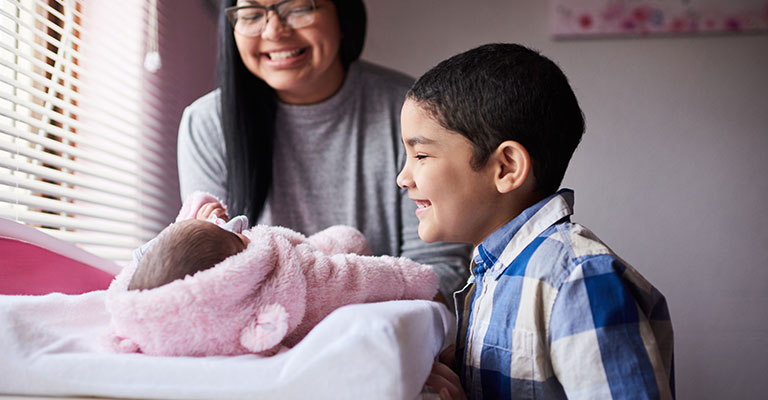Updated by the Progyny Editorial Team. Reviewed by Dr. Jennifer Trachtenberg — May 2025.
Welcoming a new baby into the family is exciting, but it can also bring a lot of change, especially for your older child. It’s normal to worry a little bit about how they’ll react to the news. Depending on their age, they might feel excited, confused, nervous — or all three!
Up to four years old
Getting ready
Toddlers or preschoolers may not totally understand what it means to have a new baby around. They will definitely notice your energy though, so keep things upbeat and positive when you talk about the baby.
Let them know that the baby will cry a lot, sleep a lot, and won’t be able to play right away. Many young kids think the baby will be ready to ride bikes and play tag from day one. Gently explain that those fun things will come later.
Some kids won’t like having another adult care for them or when you leave to deliver your baby. Reassure them that it’ll only be for a couple of days and you’ll be home soon with their new sibling.
Fun activities to try:
- Read books about becoming a big brother or sister.
- Let them open baby gifts or help put clothes away.
- Give them a doll to practice taking care of a baby.
Helping them adjust
Bringing a new baby home is a big adjustment for little ones. Give them a special job, such as grabbing a diaper or singing to the baby. Making silly faces is encouraged too!
Your toddler may regress a bit, with potty training mishaps, frequent crying, or acting like they’re a baby, too. Some kids will feel jealous of the baby and may hit or take toys away from them. This is your toddler’s way of showing you their feelings and trying to get your attention. Let them know you understand, but be clear that it’s not okay to hit anyone. Remind them they’re still loved very much.
Some may steer clear of the baby for a bit. That’s normal, they’ll just warm up in their own time.
Over four years old
Getting ready
For older kids, talk about the baby like a real person with thoughts and feelings. Ask what they think it’ll be like to have a new sibling. Let them know that the baby will cry and need a lot of your time, but there will be fun stuff too. If they’re interested, let them feel the baby kicking.
Fun activities to try:
- Let them pick out a small gift or toy for the baby.
- Show how the baby’s growing using a chart, calendar, or video.
- Ask what names they like for the baby, but don’t give them a final say.
Helping them adjust
When the baby comes home, give your older child a special job, such as giving a little tour of the house or picking out a book to read to their siblings. Thank them when they help out and let them know they’re doing really well.
Take the time to check in on your child’s needs and emotions. It may be helpful to explain that the baby cries because it doesn’t have another way to communicate its needs. It’s okay to give your child some time and space away from the baby
Check in on how they feel. Tell them how babies cry because they can’t talk yet. And it’s totally fine if they need some space away from the baby for a bit.
Tips for all ages
Getting ready
Kids will likely ask how the baby is growing, where they are, and how they’ll be born. Try to answer using age-appropriate terms. Let them hear the baby’s heartbeat during a prenatal appointment if possible. Bringing out their baby photos may help them understand they once received a lot of attention, too.
If big changes like potty training or moving bedrooms are coming up, try to get those done a couple of months before or after the baby arrives. And don’t feel rushed to ditch comfort items like pacifiers or blankets. Those can help kids feel secure during big transitions.
Most importantly, spend some one-on-one time doing what your child loves.
Helping them adjust
If possible, have your child be the first to meet the baby at the hospital. It’ll help them feel involved right away. Stick to regular routines for school, childcare, or play dates. Kids will adjust better when they have a sense of stability when everything else feels different.
Remember to make time just for them, whether it’s you, your partner, a grandparent, or another close adult. That extra attention reminds them that they’re still a very important part of the family.
All in all
Helping your older kid adjust to a new baby is all about patience, preparation, and connection. Talk with them, include them, and make time for the things they love. Every child will react in their own way, and that’s okay. With a little reassurance and plenty of love, your growing family will find a new rhythm together.
Progyny is here for you. If you have any questions, please contact your Progyny Care Advocate for support.
